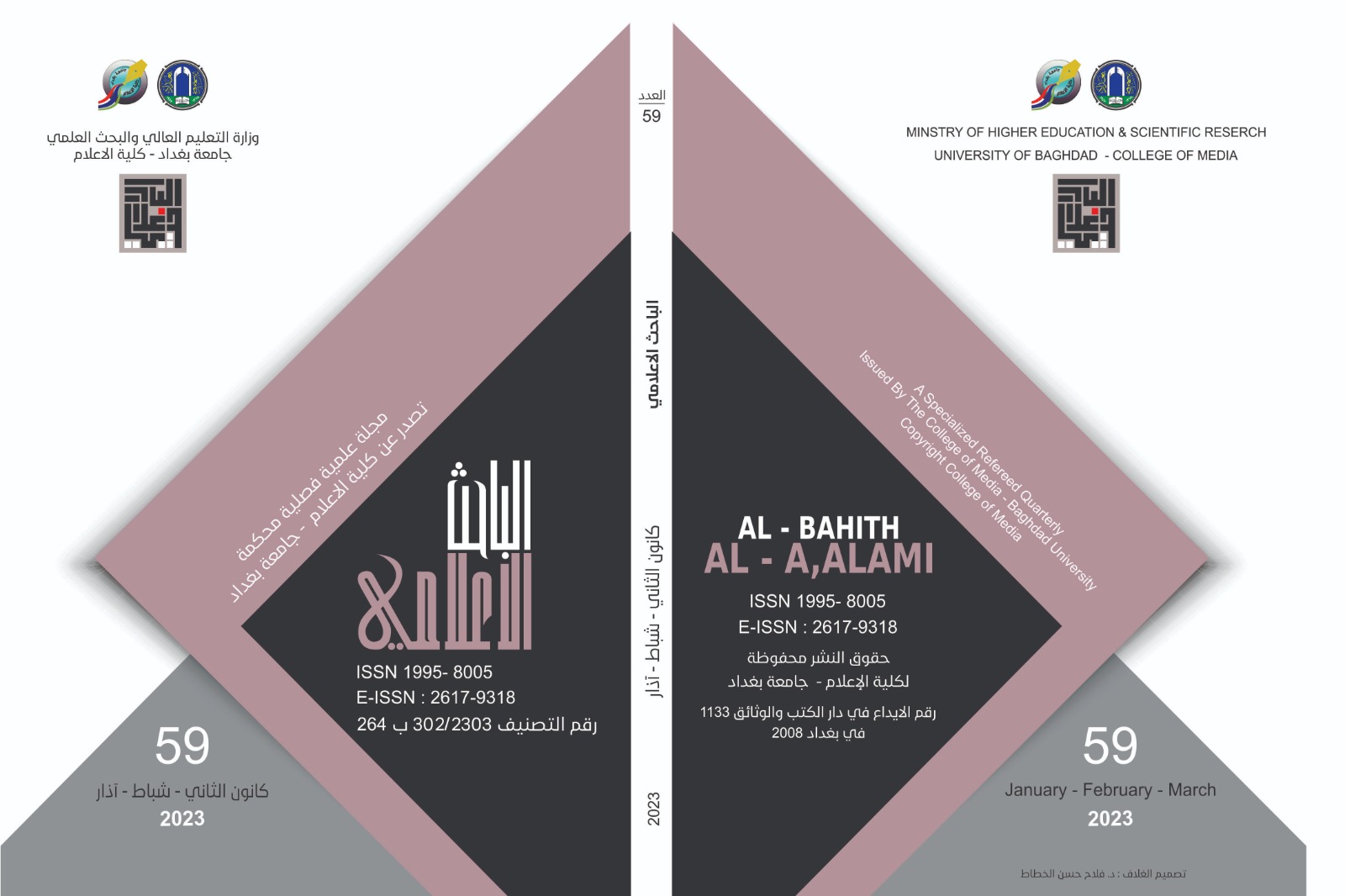Marginalization strategies in Iraqi newspapers' coverage of the October 2019 protests “Paradigm” Module
DOI:
https://doi.org/10.33282/abaa.v15i59.959Keywords:
Marginalization strategies; News Coverage; Al-Sabah Newspaper; October ProtestsAbstract
This study aims to inspect the marginalization strategies implemented by Iraqi newspapers, with a focus on the daily newspaper (Al-Sabah) and its coverage of the October 2019 protests in Iraq, by employing the “Paradigm” Module. The research is descriptive the researcher implemented a descriptive-analytical survey method by using a non-probability sampling represented by (74) issues of Al-Sabah newspaper and used (content analysis form) as a tool to analyze (93) news content related to the October protests.
The Researcher reached several conclusions:
1- Al-Sabah newspaper mainly depends on “Economic Reforms” as a marginalization strategy in its news coverage of the October 2019 protests.
2- The newspaper focused mainly on the (official sources), ignoring protesters themselves, and limited its coverage to official sources, religious, and social figures.
3- Implementing the “conspiracy” strategy, consistent with the Iraqi government’s repeated arguments to marginalize the protests while promising to conduct investigations.
4- There are similarities between the “Paradigm” Module presented in this research and the Dardis, Frank E. “Paradigm” Module.
Downloads
References
Ali, Y. H., & Al-Sarrag, S. h. (2019). press Coverage Of Youth Social Problems An analytical Study of Al- Sabah Newspaper. ALBAHITH ALALAMI, 11(43), 183-198. doi:https://doi.org/10.33282/abaa.v11i43.252
Alshamary, M. (2020). Protestors and Civil Society Actors in Iraq: Between Reform and Revolution. Sulaimania, Iraq: Institute of Regional and International Studies, American University of Iraq, Sulaimani and Konrad Adenauer Stiftung.
Boyle, M. P., McCluskey, M. R., Devanathan, N., Stein, S. E., & McLeod, D. (2004). “The Influence of Level of Deviance and Protest Type on Coverage of Social Protest in Wisconsin from 1960 to 1999.”. Mass Communication & Society, 7(1), 43-60.
Dardis, F. E. (2006). Marginalization Devices in U.S. Press Coverage of Iraq War Protest: A Content Analysis. Mass Communication & Society, 9(2), 117-135. doi:https://doi.org/10.1207/s15327825mcs0902_1
Gustafson, E., & et. al. (2020). The Long Game: Iraq's "Tishreen" Movement and the Struggle for Reform. Sulaimania: Enabling Peace in Iraq Center.
Hertog, J. K., & McLeod, D. M. (1995). “Anarchists Wreak Havoc in Downtown Minneapolis: A Multi-level Study of Media Coverage of Radical Protest.”. Journalism and Communication Monographs, 151.
Hurd, I. (2019). Legitimacy. Retrieved 11 6, 2022, from Princeton University: https://pesd.princeton.edu/node/516
Kelman, H. C. (1976). Some reflections on authority, corruption, and punishment: The social-psychological context of Watergate. Psychiatry, 39(4), 303-317.
Khammash, H. A., & Ghintab, A. S. (2018). Framing war against ISIS in New York Times/from 10/17/2016 to 4/16/2017. ALBAHITH ALALAMI, 10(40), 161-182.
McLeod, D. M., & Hertog, J. K. (1999). “Social Control, Social Change and the Mass Media’s Role in the Regulation of Protest Groups.”. In D. D. Kasisomayajula, Mass Media, Social Control and Social Change A Microscopical Perspective. Ames: Iowa State University.
Salim, M., & Louisa , L. (2019, October 02). Hundreds wounded in Iraq as police fire gas, bullets at protestors. Retrieved from The Washington Post: http://bit.ly/3ynl8XC
Shoemaker, P. J. (1982). The Perceived Legitimacy of Deviant Political Groups: Two Experiments on Media Effects. Communication Research, 9(2), 249-286.
Smith, J. (2001). Globalizing Resistance: The Battle of Seattle and the Future of Social Movements . Mobilization: An International Quarterly , 6(1), 1-19.
Tyler, T. R. (2001). 17 A psychological perspective on the legitimacy of institutions and authorities. In J. T. Jost, & B. Major, The psychology of legitimacy: Emerging perspectives on ideology, justice, and intergroup relations (1st ed., pp. 416-436). Cambridge: Cambridge University Press.
Weaver, D. A., & Scacco, J. M. (2013). Revisiting the protest paradigm: The Tea Party as filtered through prime-time cable news. The International Journal of Press/Politics, 18(1), 61-84. doi:https://doi.org/10.1177/1940161212462872
Zurn, M. (2004). Global governance and legitimacy problems. Government and Opposition, 39(2), 260-287. doi:https://doi.org/10.1111/j.1477-7053.2004.00123.x
رشدي احمد طعيمة. (2004). تحليل المحتوى في العلوم الإنسانية. القاهرة: دار الفكر العربي.
Downloads
Key Dates
Published
Issue
Section
License
Copyright (c) 2023 ALBAHITH ALALAMI

This work is licensed under a Creative Commons Attribution 4.0 International License.
Authors retain copyright and grant the journal right of first publication with the work simultaneously licensed under a Creative Commons Attribution License (CC BY 4.0) that allows sharing the work with recognition of authorship and initial publication in ABBA journal.


















